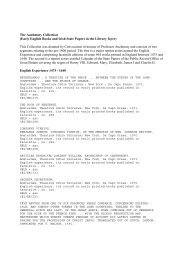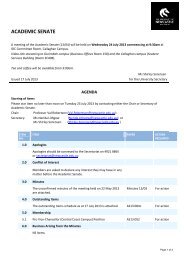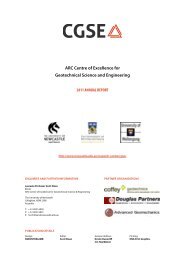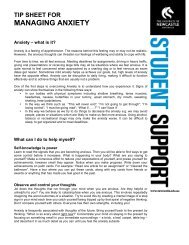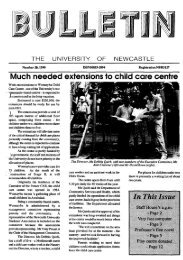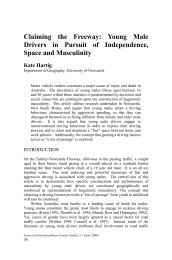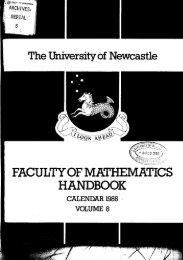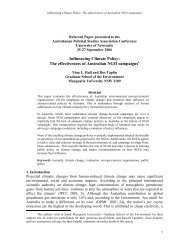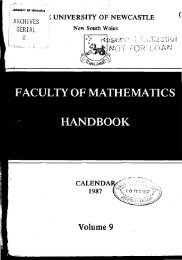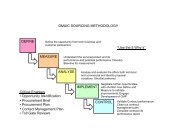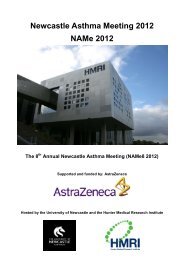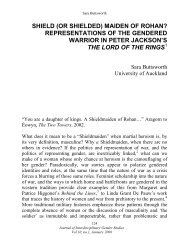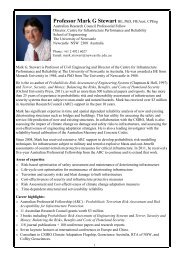n - University of Newcastle
n - University of Newcastle
n - University of Newcastle
Create successful ePaper yourself
Turn your PDF publications into a flip-book with our unique Google optimized e-Paper software.
9 -4 AN AUSTRALIAN LANGUAGE.<br />
The affines used in the language <strong>of</strong> the aborigines <strong>of</strong> this<br />
colony show the nature <strong>of</strong> the verb, whether causative, declarative,<br />
or active; whether personal, instrumental, self-active, or loco-<br />
motive ; and whether negative, affirmative, privative, apparent,<br />
or actual. It is only by a strict attention to the root-meaning<br />
<strong>of</strong> the affixes, that they can be properly applied to express the<br />
modified uses <strong>of</strong> the principal word to which they are joined,<br />
whether that principal be a verb, a proper name <strong>of</strong> a person or<br />
lace, or a common substanti\.e.<br />
Ill.ust~atiz7e Sentences,"<br />
to show the force <strong>of</strong> the variations <strong>of</strong> the conso-<br />
nants in the suffix-forms <strong>of</strong> the verb.<br />
SUFFIXES.<br />
1. .b-illi-Po ; m., for the pzrrpose <strong>of</strong>-the root-meaning<br />
<strong>of</strong> the cerb.<br />
Exanzples :-1. Gatun tunbilliela noa barun talokan,<br />
aud he divided unto them the property.' 2. Tiigun- billia<br />
nura, 'show yourselves.' 3. Kapirrb wirri ban-billin, 'I<br />
am perishing with hunger.'<br />
Analysis :-1. Gat un, ' and'; tun, the root <strong>of</strong> the verb ' to ap-<br />
portion, divide, ieparate, count '7-bil li e 1 a, the past participle<br />
<strong>of</strong> billiko ; no a, 'he,' the verbal-nominative form <strong>of</strong> the pro-<br />
noun ; barun, 'them'; t aloka?, ' property, goods.' - - . - d-~<br />
2. Thgun, as a verb, 'to show'; as anoun, 'a mark for asign,'<br />
'a chop on a tree to show the road '<br />
3. Kapi:x& ' hunger '; the o makes the word an instrumental<br />
case ; $ir?i is the root <strong>of</strong> the verb wirrilliko, ' for lnotion to<br />
act,' as an instrument ; ban, 'doing, acting '; - billin is the form<br />
<strong>of</strong> the present participle <strong>of</strong> that verb.<br />
2. -b-ulli-7co; m., to be doiffy efectiaely lohat fhe verb<br />
implies.<br />
Ex.:--Minnug ballin bi? 'what object art thou effecting?<br />
mhat are you doing ? mhat are you about' ? Tetti ballin ba&<br />
'I am dying.'<br />
* I have here omitted twelve panes <strong>of</strong> " The Key "; in them our authop<br />
sets forth his theory that tbe vowels and consonants <strong>of</strong> the snffix-forms <strong>of</strong><br />
verbs and pronouns have each <strong>of</strong> them a determinate and essential meaning ;<br />
a portion <strong>of</strong> this theory appears in the headings <strong>of</strong> the twenty sections <strong>of</strong><br />
" Illustratire Sentences " which now follow. These Illustrative Sentences I<br />
pr~nt for the sake <strong>of</strong> the examples <strong>of</strong> analysis which they coutain ; and get<br />
I do not think that that analysis is in every instance correct.-ED.<br />
THE KEY. 95<br />
-p-ulli-ko; m., to be doiqag zohat the cerb in~lies,<br />
zuithozrt the idea <strong>of</strong> eflcct.<br />
Ex.:-Up-ullin bag yirrigko wiyelliko, 'I amwriting';<br />
lit., 'I am using the quill for-to " communicate, speak, say.'<br />
Anal.:-Yir~ie, ' a. quill'; yirrigko, 'the quill as an agent' ;<br />
urn-ullin Ea-yirrigko pen kakilliko, 'I am makingapen';<br />
lif., ' I am cau~i~lg the quill to become a pen.'<br />
3. -k-illi-Po ; m., to become, to coaze to be ifa some state.<br />
Ex.:-1. Tetti kakulla noa, wonto ba prtkita moron<br />
noa kat &a kan, ' he was dead, whereas now he is alive again.'<br />
2. Wunal unni kakillin, ' this is summer season,' or ' this isbecoming<br />
(now) warm.'<br />
Awal. :-1. T et ti, 'dead, or death'; kaliulla, ' mas' in that<br />
state; noa, the inseparable verbal pronoun ' he' ; wont o b a,<br />
'whereas it is '; yakifi, 'at this time '; moron, ' alive';<br />
-liat&a-kan, 'one 'who exists again'; tetti kaba noa, 'he is<br />
actually dead'; lit., ' he (died and so he) is in a state <strong>of</strong> death.'<br />
2. Wun a 1 means 'warm '; the aborigines have no word for time<br />
in the abstract; unni, ' this '; kakillin, ' a state <strong>of</strong> being,' the<br />
present participle form <strong>of</strong> the verb kakilliko, p.v. Wu~lal<br />
nni kakullin, 'the summer is now coming '; lit., ' the varnlth<br />
<strong>of</strong> its own power becoming to be in the present state '; a redupligate<br />
form <strong>of</strong> the participle kakullin, 'becoming,' is lialrullilin,<br />
'becoming and continuing to become'; cf. nest paragraph<br />
for the difference in meaning between k akillall and kakullin.<br />
4. -k-ulli-Po ; m., to 6~ilz.y into beiny any nct clojze by<br />
one's OLC~ pozoer.<br />
Ex.:-1. Boug-kullklin yuna bo ta Pirival to, gatun<br />
pai-kullblin Thimon-kin, 'the Lord hath risen indeed, and<br />
hnth appeared unto Simon.' Each <strong>of</strong> these acts is <strong>of</strong> the Lord's<br />
onnpomer. 2. Punnal ba polog-kulli-gb1,is 'thewest;'.<br />
- 3. Por-lrullitoara means 'that which is born '; lit., 'that which<br />
has dropped itself <strong>of</strong> its own power,' 'that which has fallen <strong>of</strong><br />
itself.' 4. Poai-kullbun ba, ' as soouas it sprungup.' 5. Paikul-linlin<br />
bara ba, ' when they will shoot forth.' -<br />
Anal. :-2. Punnal, 'the sun'; ba. 'is being', a verbal particle;<br />
olo& 'to sink'; -kulli, ' <strong>of</strong> his own power '; -&&I, ' the place<br />
%6& action.' This phrase then means 'the place <strong>of</strong> the sun's<br />
sinking <strong>of</strong> his own power.'<br />
4. Poai, 'to shoot up, to grow up, to spring up as grass';<br />
-kullA~n, 'has ... <strong>of</strong> its own power '; ba, equivalent to ' when.'<br />
5. Pai, ' appear'; -kullini~n, 'will<strong>of</strong> their own power'; bara,<br />
'they '; b a, equivalent to ' when.'<br />
* Occasionally I still allow this phrase to stand.-See note, page 24.-ED.



